SWaCH, Pune's Cooperative Of Waste Pickers, Is Reducing Garbage That Reaches Landfills
SWaCH, a cooperative of waste pickers, offers a lesson for cities on how to include waste pickers into the formal system by offering door-to-door waste management facilities.
-
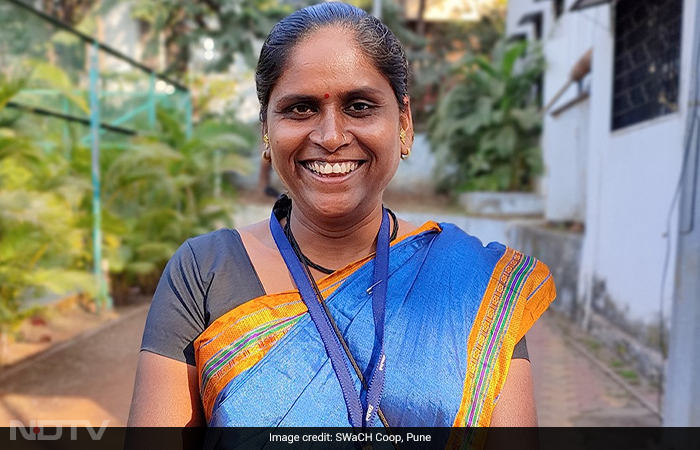 35-year-old Vidya Naiknaware from Dhankawadi in Pune city leaves her house at 7:15 am every day for work. A brisk walk leads her to an assembly point for attendance. After a quick 15-minute roll call and general catching up, Ms. Naiknaware and her colleagues disperse for door-to-door collection of Municipal Solid Waste (MSW)
35-year-old Vidya Naiknaware from Dhankawadi in Pune city leaves her house at 7:15 am every day for work. A brisk walk leads her to an assembly point for attendance. After a quick 15-minute roll call and general catching up, Ms. Naiknaware and her colleagues disperse for door-to-door collection of Municipal Solid Waste (MSW) -
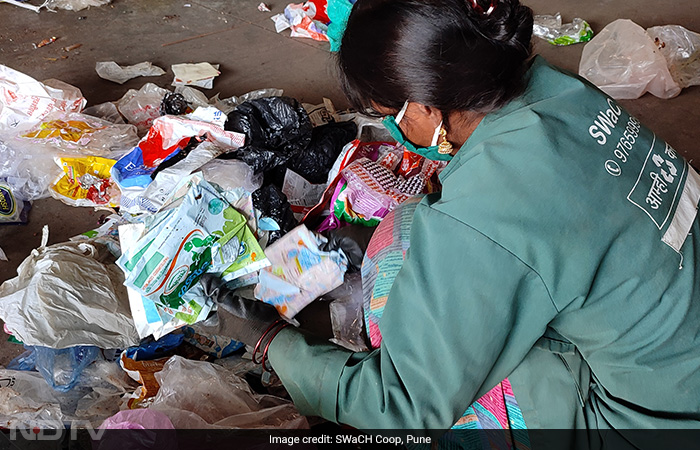 In parts of Pune, each household hands out waste segregated into three primary categories - wet, dry and sanitary waste including sanitary napkins, diapers and condoms. Along with this, thermocol waste is given separately as that is voluminous in nature. After door-to-door waste collection, waste pickers segregate and sort collected waste.
In parts of Pune, each household hands out waste segregated into three primary categories - wet, dry and sanitary waste including sanitary napkins, diapers and condoms. Along with this, thermocol waste is given separately as that is voluminous in nature. After door-to-door waste collection, waste pickers segregate and sort collected waste. -
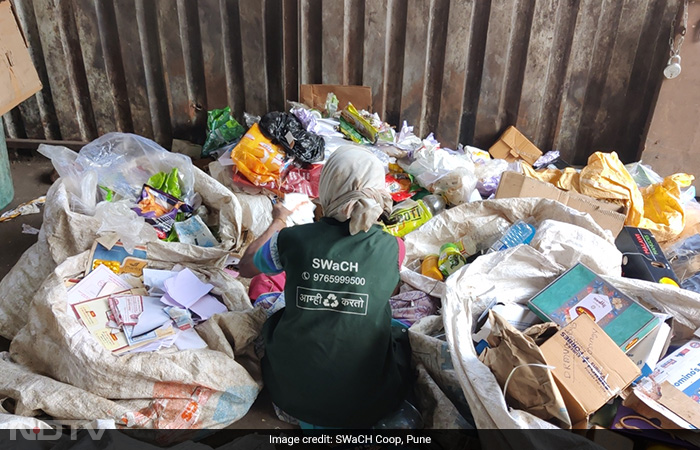 The dry waste collected from each house is further segregated into categories like plastic bottles, containers, food boxes, plastic bags, and multilayered plastic, among others. Ms. Naiknaware recovers valuable waste and sells it to recyclers for livelihood. The non-recyclable dry waste, or things like shampoo sachets which can't be sold by her, are dropped off at Pune Municipal Corporation (PMC) ‘feeder points'.
The dry waste collected from each house is further segregated into categories like plastic bottles, containers, food boxes, plastic bags, and multilayered plastic, among others. Ms. Naiknaware recovers valuable waste and sells it to recyclers for livelihood. The non-recyclable dry waste, or things like shampoo sachets which can't be sold by her, are dropped off at Pune Municipal Corporation (PMC) ‘feeder points'. -
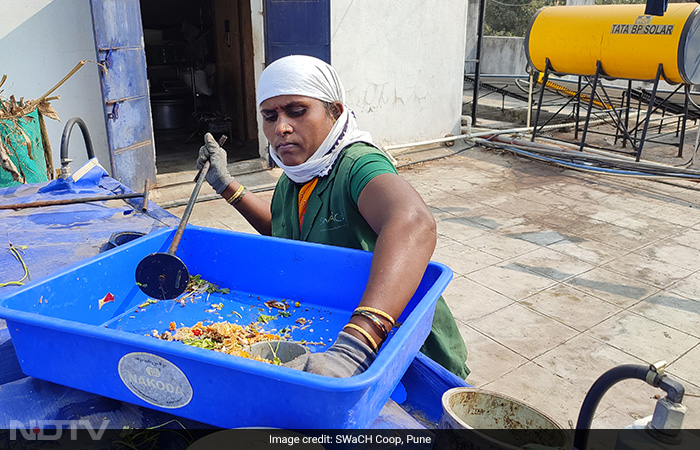 Ms. Naiknaware is a part of SWaCH (Solid Waste Collection and Handling), India's largest cooperative, completely owned by waste workers. But, much before becoming a part of SWaCH, waste pickers and itinerant waste pickers/collectors in Pune and Pimpri Chinchwad were a part of Kagad Kach Patra Kashtakari Panchayat (KKPKP), a membership-based trade union in 1993.
Ms. Naiknaware is a part of SWaCH (Solid Waste Collection and Handling), India's largest cooperative, completely owned by waste workers. But, much before becoming a part of SWaCH, waste pickers and itinerant waste pickers/collectors in Pune and Pimpri Chinchwad were a part of Kagad Kach Patra Kashtakari Panchayat (KKPKP), a membership-based trade union in 1993. -
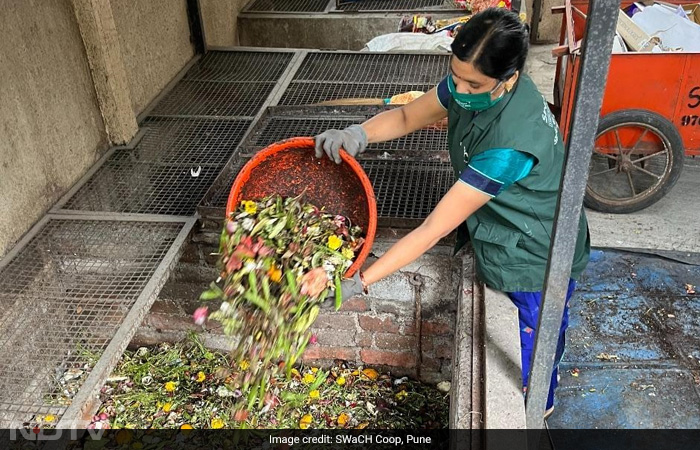 Ms. Naiknaware, a waste picker, is now recognised and appreciated by Pune Municipal Corporation (PMC) for the same work she used to do informally. In 2007, SWaCH, a cooperative was formed by KKPKP and PMC together through a general body resolution of PMC. The cooperative is completely owned by its waste picker members. An agreement between PMC and SWaCH was formulated to decentralise waste management in Pune.
Ms. Naiknaware, a waste picker, is now recognised and appreciated by Pune Municipal Corporation (PMC) for the same work she used to do informally. In 2007, SWaCH, a cooperative was formed by KKPKP and PMC together through a general body resolution of PMC. The cooperative is completely owned by its waste picker members. An agreement between PMC and SWaCH was formulated to decentralise waste management in Pune. -
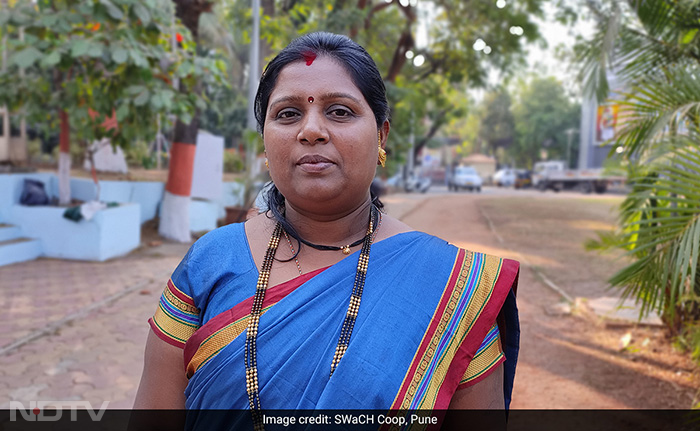 Today, around 3,700 waste pickers are a part of SWaCH, covering over 9.5 lakh properties. 70 per cent of waste pickers are women who have attained financial independence. One such woman is 40-year-old Rani Shivsharan from Hadapsar town in Pune city who now earns Rs. 20,000 to Rs. 25,000 per month contrary to Rs. 10,000 to Rs. 15,000 she would make before joining SWaCH.
Today, around 3,700 waste pickers are a part of SWaCH, covering over 9.5 lakh properties. 70 per cent of waste pickers are women who have attained financial independence. One such woman is 40-year-old Rani Shivsharan from Hadapsar town in Pune city who now earns Rs. 20,000 to Rs. 25,000 per month contrary to Rs. 10,000 to Rs. 15,000 she would make before joining SWaCH. -
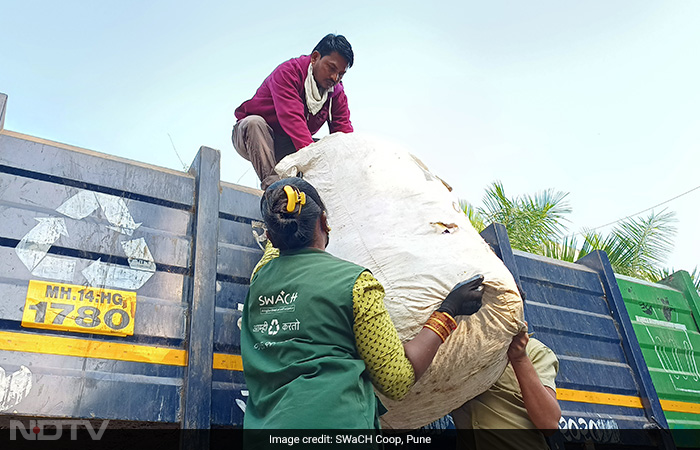 Pick Up Van: SWaCH workers collect and sort waste and hand over the non-recyclable waste to PMC. This decentralised system of waste management costs PMC Rs. 7.7 crore per annum - including Rs. 4.3 crore of administrative costs, Rs. 1 crore for equipment like pull carts, and Rs. 2.4 crore is spent on user-fee subsidies given to slum dwellers. As per the impact report prepared by SWaCH, PMC saves Rs. 21 crore because of waste workers who sort and send waste for recycling instead of sending it to landfill and Rs. 92 crore in manpower costs.
Pick Up Van: SWaCH workers collect and sort waste and hand over the non-recyclable waste to PMC. This decentralised system of waste management costs PMC Rs. 7.7 crore per annum - including Rs. 4.3 crore of administrative costs, Rs. 1 crore for equipment like pull carts, and Rs. 2.4 crore is spent on user-fee subsidies given to slum dwellers. As per the impact report prepared by SWaCH, PMC saves Rs. 21 crore because of waste workers who sort and send waste for recycling instead of sending it to landfill and Rs. 92 crore in manpower costs. -
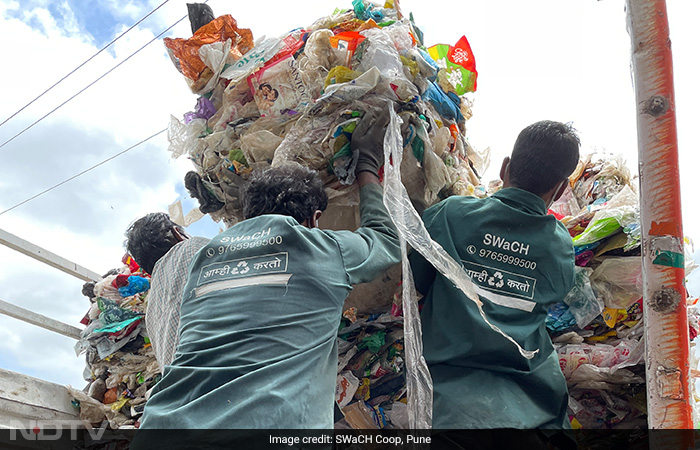 According to the information shared by SWaCH, waste pickers divert 200 metric tonnes of dry waste from landfills every day and send it for recycling. Under Extended Producer's Responsibility (EPR), 100kg of thermocol waste and 3 tonnes of multi-layer plastic is collected and sent for recycling daily. Waste pickers also collect 3 tonnes per day (TPD) of sanitary waste, 6.5 TPD of waste that is composted and used to generate biogas and 1 TPD of reusable waste like bags.
According to the information shared by SWaCH, waste pickers divert 200 metric tonnes of dry waste from landfills every day and send it for recycling. Under Extended Producer's Responsibility (EPR), 100kg of thermocol waste and 3 tonnes of multi-layer plastic is collected and sent for recycling daily. Waste pickers also collect 3 tonnes per day (TPD) of sanitary waste, 6.5 TPD of waste that is composted and used to generate biogas and 1 TPD of reusable waste like bags. -
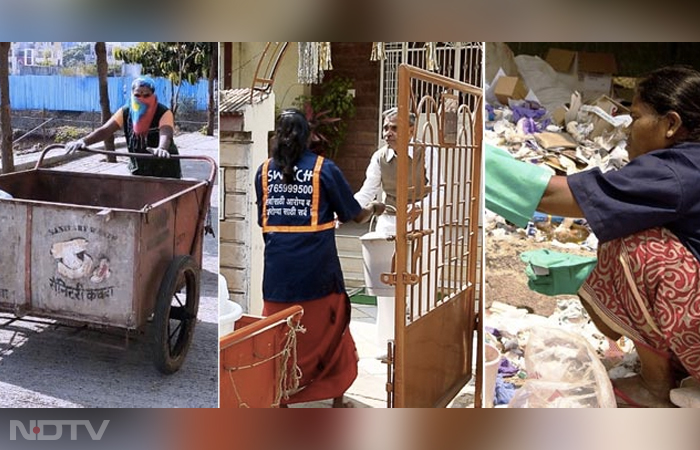 'Being at the beginning of the chain, their door-to-door collection and sorting of dry recyclables ensure high-quality segregated inputs for PMC's processing plants hence diverting maximum waste from landfills,' said Dr. Ketaki Ghatge, Medical Officer in the SWM Department, PMC. She adds, "Only rejects from processing plants end up in a landfill. Without the presence of SWaCH waste pickers, a large amount of mixed waste would be rejected by plants and therefore end up in landfills."
'Being at the beginning of the chain, their door-to-door collection and sorting of dry recyclables ensure high-quality segregated inputs for PMC's processing plants hence diverting maximum waste from landfills,' said Dr. Ketaki Ghatge, Medical Officer in the SWM Department, PMC. She adds, "Only rejects from processing plants end up in a landfill. Without the presence of SWaCH waste pickers, a large amount of mixed waste would be rejected by plants and therefore end up in landfills."
Advertisement
Advertisement
Advertisement
